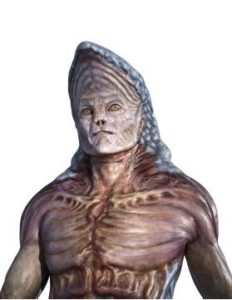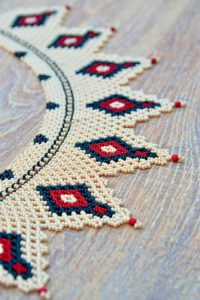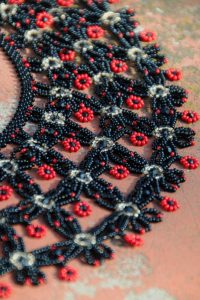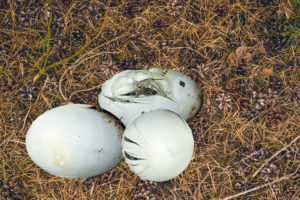Welcome to my series “Interview With an Alien,” part 2 of my conversation with Ambassador Phlip from the planet of Agzagi.
S: What is your family life like? Do you marry for life, or only for reproduction?
P: We mate for reproduction once every six cycles around our star. It is difficult to compare to your time frame, but I estimate it would be a little over three of your years. Different males mate each cycle.
S: Do you have a courting ritual?
P: Ritual? No. We have a procedure. The male puts on a mating necklace, goes to the female’s abode, and pounds on his chest and shrills at her. If she admits him, they go to the sleep pallet, and he walks around her several times, continuing to pound his chest and shrill, creating a track within which an egg nest will be built. If she touches noses with him, she has accepted him. Then he goes out and collects reeds and moss for the nest and brings it back. Then they mate. The eggs hatch half a cycle later.
S: Do you stay with that mate for life, or does you change each cycle?
P: Usually, the males will seek a new mate each cycle, but sometimes one of us finds a mate we choose to stay with for several cycles, though not a lifetime.
S: Forgive me if it seems I’m prying into personal things, but we are eager to learn about each new sentient species we encounter. Would you say that love, as an emotion, is important to your mating?
P: It is difficult for me to understand love as humans seem to define it. As a male, I look at the physical aspects of a female, her profession, and the likely qualifications of our offspring. Most of us use genetic testing prior to mating to determine the best pairing. Of course, we feel… a desire to protect our offspring, though that is more a community effort than individual.
S: Do the females ever choose their mate?
P: They do not actively pursue a mate, as they do in your culture, but they are free to reject any approach. If the genetic testing shows one male to be more of interest than another, she may indicate her interest to the preferred male. And they can reject a male in one cycle and still accept him in another. When they have accepted one, they put a mark on the door so others will know.
S: What does the courting necklace look like? Does every male wear the same type?
 P: Each male has a unique design made by his mother for his first courting. The one on the left is mine. Black represents male in our culture, and red the female. White stands for fertility. The design on the right was created by one of my mates for one of our sons.
P: Each male has a unique design made by his mother for his first courting. The one on the left is mine. Black represents male in our culture, and red the female. White stands for fertility. The design on the right was created by one of my mates for one of our sons.

S: These are beautiful! How are they made?
P: Some are polished from stones. At one time, our planet had seas, but those dried up ages ago. Some of the beads are fossils from ancient sea life.
S: Your mating procedure sounds much simpler than our way of doing things.
P: I don’t believe even humans understand how to mate properly. Some mate for life, some don’t. Some court for years, others for short periods. It is utter chaos. You breed too well in spite of that. You need to breed less often.
S: You’re referring to our overpopulation problems.
P: Yes. It is very impractical to populate beyond your resources. In the rare instance that our resources are lean for some reason, we refrain from mating.
S: Do the females on your planet raise the children, or do the males participate?
P: Our young are self-sufficient from hatching. They remain in the nest for a few days eating food provided by their mother. Then they move out to find empty homes or dig new ones. They are educated by the community, both males and females. I have heard some here claim there is discrimination against females, particularly in employment. We do not discriminate.
S: Do you have more than one baby at a time?
P: Normally there are two or three eggs to a clutch.
S: Do you ever have trouble getting your young to behave, or to do what they are supposed to?
P: Behavior is a learning experience for all young, even those that are not sentient. For those that are sentient and intelligent, misbehavior is inevitably a part of their mental growth. Those who learn quickly inevitably rise to advanced positions.
S: How do you discipline your young?
P: The teacher will isolate them for a time, or require them to do strenuous physical tasks. When possible, the discipline is related to the behavior. For instance, if a young one steals, he might be required to return what he stole, plus give something he values to the one he stole from.
S: What about adult offenders? Do you have prisons?
P: No. In rare cases, if an individual behaves in a manner counter-productive to the community, they are exiled to a less populated area and left to fend for themselves. Often, after a few cycles, they will apply for re-admittance. Some prefer a solitary life.
S: What about you, personally? Do you enjoy your role as an ambassador to other planets?
P: We do not choose professions based on what we might enjoy. That would be impractical. There might be some professions no one would choose. As I went through schooling, my teachers determined I would be suited to working with alien species. However, I find what I do to be fulfilling, in that it serves my people.
S: What surprised you most about Earth?
P: Chaos. Your people are disorganized and poorly disciplined. Streets have dead ends. Cars, on which you heavily depend, do not always function as they should. Perhaps such chaos is part of your youth as a technological species. I can see some similarities between how your people behave now, and how our species did two or three thousand generations ago.
S: I don’t know. We’re obviously very different from you. What have you enjoyed most about Earth?
P: The one thing I have enjoyed are your mountain ranges. Our people love to climb, but our mountains are significantly lower than yours. I have climbed in Colorado and Utah, and I am looking forward to a chance to go to Asia to climb there, though I might have to wear some protective gear against the cold for the highest mountains.
S: I hope you do get the opportunity to do that. What type of climbing gear do you use? Something high tech? (I think he’s laughing, a gutteral hissing sound, and he’s waving his long fingers and sharp claws in my face.)
P: My race does not need assistance in climbing.
S: Yes, I can see that. Well, it has certainly been interesting talking with you, but I have to draw things to a close. Thank you so much for talking with me today.
P: You are welcome. It is part of my role to educate your people about my people.
Readers, join me next week, when I interview Chkben from Orozh (official Earth Department of Interstellar Affairs alliteration). Until then, fly high and free.
